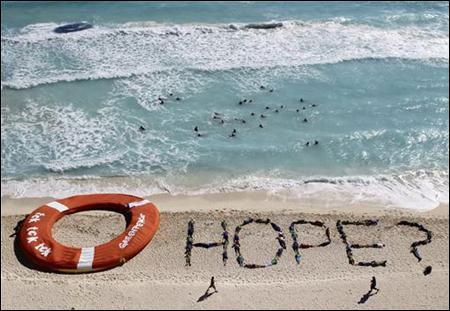Photographs: Henry Romero/Reuters Piyali Mandal in New Delhi
Nearly 200 countries meet in Doha for annual talks, that began yesterday, on checking global warming. Here is a snapshot of what happened in Doha on Day 1, and what the domestic industry thinks about the global talks.
Even as negotiators start discussions and deliberations in Doha to come up with a road map to address global warming, Indian industry already seems to have given up hope that about 200 nations would arrive at a consensus.
There is definitely lack of active participation from the industry, primarily due to the poor performance of the carbon credit market and the general negative sentiment in the economy. Though power and renewable energy companies are actively involved at the domestic level, companies are not very bullish globally.
"Global climate negotiations in a different country every year have become akin to a jamboree, galvanising people from 196 nations, with thinkers, policymakers, political pundits, industry leaders, activists, academicians, and a host of stakeholders coming together. Yet, they come up with low or no outcome. Industry, which has high stakes from daily business developments, is wary of another long-winding negotiation that may end in weak regulatory signals, resulting in the loss of faith of market participants," said Rita Roy Choudhury, senior director & head (environment, climate change and renewable energy), Federation of Indian Chambers of Commerce and Industry.
"It is high time climate negotiations give a positive regulatory signal for the markets, which are taking a beating from the economic crisis, and help boost investor confidence. Only then would there be momentum in the industry's mitigation initiatives," she added.
According to a London-headquartered body working on environmental issues,
"The expectations from Doha are very low. Until and unless the air is cleared over the clean development mechanism (CDM), industry's interest in climate change talks would not be revived."
CDM is the only market-based mechanism to incentivise both developed and developing nations to reduce emissions of greenhouse gases. The first CDM commitment period ends this year.
Under this, 5,000 green projects have been registered across the globe and a billion carbon credits (credits earned for avoiding every tonne of emission of greenhouse gases) have been awarded.
However, Indian companies are proactively taking action at the domestic level.
"Contrary to popular perception, our experience at CDP shows the quality of Indian companies' responses to climate change, as well as their understanding of what is at stake, has improved considerably," said Damandeep Singh, director, CDP India. Companies were discovering responding to climate change issues presented business opportunities, Singh added.
Stock exchanges, one of the main drivers for business action, have also evinced interest in carbon indices. "In the middle of the Doha negotiations, BSE will launch a Carbonex, an index of that takes a holistic view of climate change, with CDP as its data partner," Singh said.
CDP is a UK-based organisation that works with shareholders and corporations on climate change and reports on the disclosure of the greenhouse gas emissions by major corporations.



article